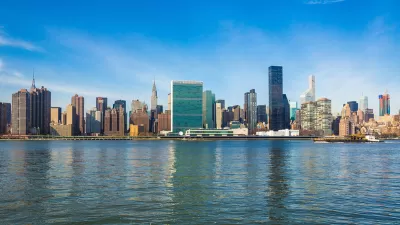A UN conference in Quito Ecuador in October 2016 looked at housing the world’s growing urban population. The Conference resulted in a document and film advocating a more organic and disorderly urban form.
The United Nations Habitat III Conference was held in Quito, Ecuador October 2016. The meeting resulted in a document entitled The Quito Papers: Towards the Open City. Additionally, the document is summarized in a short film of the same title. A central theme of the document and film is advocacy for the "open city." The open city movement argues for organic, accretive growth—moving away from plans and development engineered with efficiency as the primary goal. Writes Joseph Wager, in reviewing the document and film:
Roughly eight decades after the Charter of Athens, the voices of UN-Habitat III are enamored of the city’s chaos. Its makers call for enhanced public transit, more sustainability, greater interconnectedness; in short, a city open to changes.
. . .
The impact of the New Urban Agenda may be far-reaching, but its readership likely is not. Thus, the technical New Urban Agenda is distilled in “The Quito Papers: Towards the Open City.” Despite not relying on technology as messiah, the open city's backers recognize the short film's ability to spread their message. Specifically, they argue for a less functional city design. This visual presentation of the philosophy guiding the UN-Habitat III conference draws on the words of Joan Clos, Saskia Sassen, Richard Sennett, and Richard Burdett.
For more about the Habitat III conference, New Urban Agenda, or The Quito Papers: Towards the Open City film, please read the source article.
FULL STORY: UN advocates a more disorderly urban form in New Urban Agenda document and Quito Papers film

Maui's Vacation Rental Debate Turns Ugly
Verbal attacks, misinformation campaigns and fistfights plague a high-stakes debate to convert thousands of vacation rentals into long-term housing.

Planetizen Federal Action Tracker
A weekly monitor of how Trump’s orders and actions are impacting planners and planning in America.

San Francisco Suspends Traffic Calming Amidst Record Deaths
Citing “a challenging fiscal landscape,” the city will cease the program on the heels of 42 traffic deaths, including 24 pedestrians.

Defunct Pittsburgh Power Plant to Become Residential Tower
A decommissioned steam heat plant will be redeveloped into almost 100 affordable housing units.

Trump Prompts Restructuring of Transportation Research Board in “Unprecedented Overreach”
The TRB has eliminated more than half of its committees including those focused on climate, equity, and cities.

Amtrak Rolls Out New Orleans to Alabama “Mardi Gras” Train
The new service will operate morning and evening departures between Mobile and New Orleans.
Urban Design for Planners 1: Software Tools
This six-course series explores essential urban design concepts using open source software and equips planners with the tools they need to participate fully in the urban design process.
Planning for Universal Design
Learn the tools for implementing Universal Design in planning regulations.
Heyer Gruel & Associates PA
JM Goldson LLC
Custer County Colorado
City of Camden Redevelopment Agency
City of Astoria
Transportation Research & Education Center (TREC) at Portland State University
Jefferson Parish Government
Camden Redevelopment Agency
City of Claremont





























